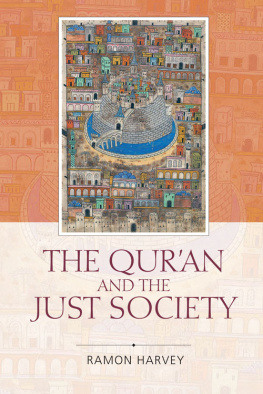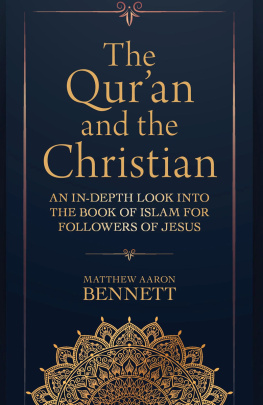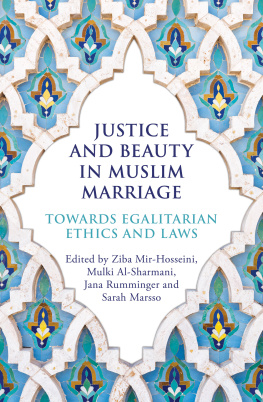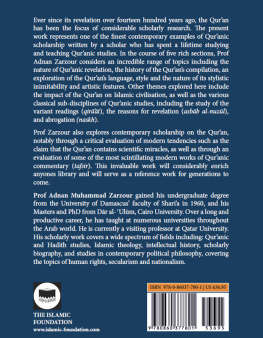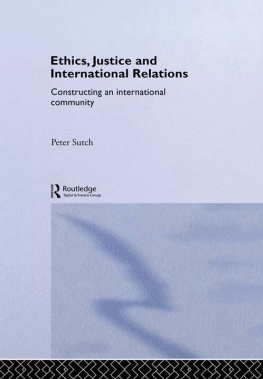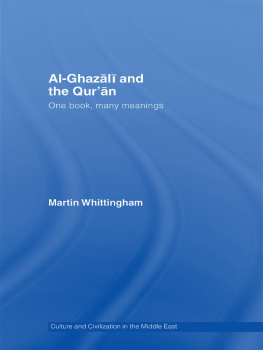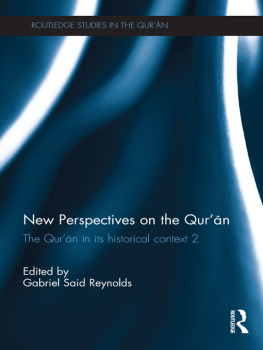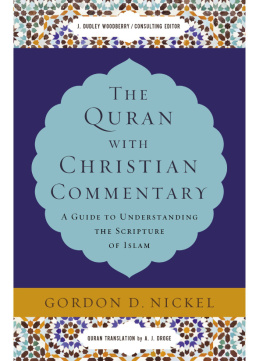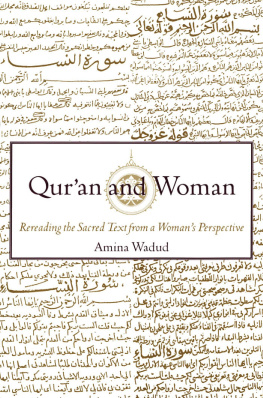
The Quran and the Just Society
Ramon Harvey
EDINBURGH
University Press
Edinburgh University Press is one of the leading university presses in the UK. We publish academic books and journals in our selected subject areas across the humanities and social sciences, combining cutting-edge scholarship with high editorial and production values to produce academic works of lasting importance. For more information visit our website: edinburghuniversitypress.com
Ramon Harvey, 2018
Edinburgh University Press Ltd
The Tun Holyrood Road
12 (2f) Jacksons Entry
Edinburgh EH8 8PJ
Typeset in 10.5/12.5 Times New Roman by
IDSUK (DataConnection) Ltd, and
printed and bound in Great Britain by
CPI Group (UK) Ltd, Croydon CR0 4YY
A CIP record for this book is available from the British Library
ISBN 978 1 4744 0329 0 (hardback)
ISBN 978 1 4744 1719 8 (webready PDF)
ISBN 978 1 4744 1720 4 (epub)
The right of Ramon Harvey to be identified as author of this work has been asserted in accordance with the Copyright, Designs and Patents Act 1988 and the Copyright and Related Rights Regulations 2003 (SI No. 2498).
Contents
Foreword by M. A. S. Abdel Haleem
The current volume is a very significant study of the Quran. It deals with one of its core themes: justice. As the Quran itself states, the pursuit of human justice was a main objective of the various prophets sent by God: We sent our messengers with clear signs, the Scripture and the Balance, so that people might uphold justice (Q. 57:25).
The academic study of the Quran is a flourishing field, and numerous studies have appeared in recent years of its history, theology, law, and various historical interpretations, but the central issue of justice in the Quran does not seem to receive the attention it deserves, and that this book captures.
The Quran and the Just Society deals with basic issues such as: what is justice? How is it realised in society? This is not a mere theoretical discussion, but rather an exploration of real situations in the Quran. The Quran itself was not revealed as a book of theoretical ideas but primarily comments on actual situations involving Muslims in the societies of Mecca and Medina in the seventh century CE . The Quran comments on moral questions in context, setting general principles to be followed. This book treats justice in the same way, discussing politics, peace treaties and alliances, jihad and jizya, and then moving on to address distributive justice, including trade, prohibition of usury, alms, war booty, marriage, and inheritance. The final part deals with corrective justice: public and private crimes.
A distinguishing feature of this book is the authors deep and intimate knowledge of the unique Arabic language and style of the Quran, which is crucial for proper understanding and judgement, especially when dealing with the issue of hermeneutics in . Without an understanding of intra-textuality, semantics, syntax-pragmatics, textual structure, and socio-historical context, readers of and writers about the Quran are likely to fall into the problem of atomistic rather than holistic interpretation. For instance, the author points out distinctive nuances between the Quranic deployment of adl and qis , both important words for justice. He also uses the above hermeneutic principles to show that the Quran consistently affirms meaningful just relationships between members of the Medinan Muslim community and non-Muslim Arabians in all parts of social life: political alliances, trade, marriages, witnessing bequests, and even compensation for manslaughter.
This insightful and timely book leads the reader on an exploratory journey through the various manifestations of the objective of divine scripture, so that people may uphold justice.
For God and the Messenger
li-llhi wa-li-l-rasl
Preface
In front of the Kaba, I am struck by the nature of time. The centuries that have passed since the lifetime of the Prophet Muammad seem flattened like the impossibly sheer silk walls of the House of God. Although the mosque complex is a flurry of construction, the Kaba itself stands imperiously. Worshippers move in concentric rings around it much as ever the calm in the eye of the storm engulfing the Muslim world, perhaps.
The rituals associated with a visit to the Kaba have survived the ravages of time in a way that the social institutions of classical Islamic civilisation palpably have not. Likewise, the waves of people circling around and around the black cube, representing the totality of human cultures, bear powerful witness to the enduring impact of the Quran, the scripture that impels pilgrimage to this location.
This book is motivated by the Quranic pledge for perpetual relevance. In an unfair world in dispute over the nature of justice, I invite contemplation of the Qurans vision for the just society and its offer of principles that transcend time.
Ramon Harvey
14 Jumd al-khira 1437/23 March 2016
Mecca
Acknowledgements
This book started life as a PhD thesis submitted to the Department of the Near and Middle East in the School of Oriental and African Studies (SOAS), University of London. I would like to thank my doctoral supervisor, Professor M. A. S. Abdel Haleem, for his treasury of insight into the Quran and his continual encouragement and support for my scholarship. It is an honour to have him pen the foreword. I would also like to send my appreciation to Dr Ayman Shihadeh and Professor Abdul-Hakim Al-Matroudi, who read chapters of the thesis and provided positive feedback and constructive criticism, as well as Dr Mustafa Shah, who has been supportive of my related research on Quranic variant readings.
From SOAS, I was appointed to the Cambridge Muslim College (CMC) as a research fellow, where I spent two years substantially rethinking and rewriting this book, as well as developing other projects. I am profoundly grateful to Dr Tim Winter and the team at the CMC for their support of my work and I am happy that I have been able to remain a visiting member of the faculty.
Since September 2016, I have joined Ebrahim College (EC) as Lecturer in Islamic Studies. Within the vibrant environment of EC in the heart of East London, the book has taken its final shape. I would like to thank the director, Shaykh Shams Ad-Duha Muhammad, all the EC staff, and my students for their encouragement.
The road to publication is long and a writer craves sympathetic readers. I would like to pay particular tribute to my friend and colleague Dr Harith Bin Ramli, whose questions, provocations, detailed annotations, and coffee-fuelled conversations have provided the whetstone at which I have been forced to sharpen my thinking and assess my own theological assumptions. Likewise, my friend Dr Samer Dajani has kindly read chapters and provided useful points from his own areas of interest. My thanks is also extended to Andrew Booso for commenting on an early draft of the whole book and Saquab Ashraf for his help with the diagrams.
I am grateful to Nicola Ramsey at Edinburgh University Press (EUP) for her positivity towards this book from the outset and to her whole team for the warm, patient, and understanding way in which they have worked with me. I also thank my two anonymous reviewers who were extremely encouraging about the books potential and provided thoughtful and constructive critique, leading to a more comprehensive and better-framed text overall.
The present work has lived with me for the last eight years and all the challenges and joys of life during that time. So many more teachers, mentors, friends, and students deserve to be recognised than I can mention here; I send thanks to all.
Next page
